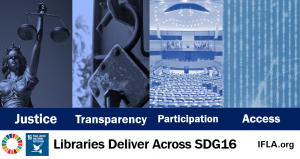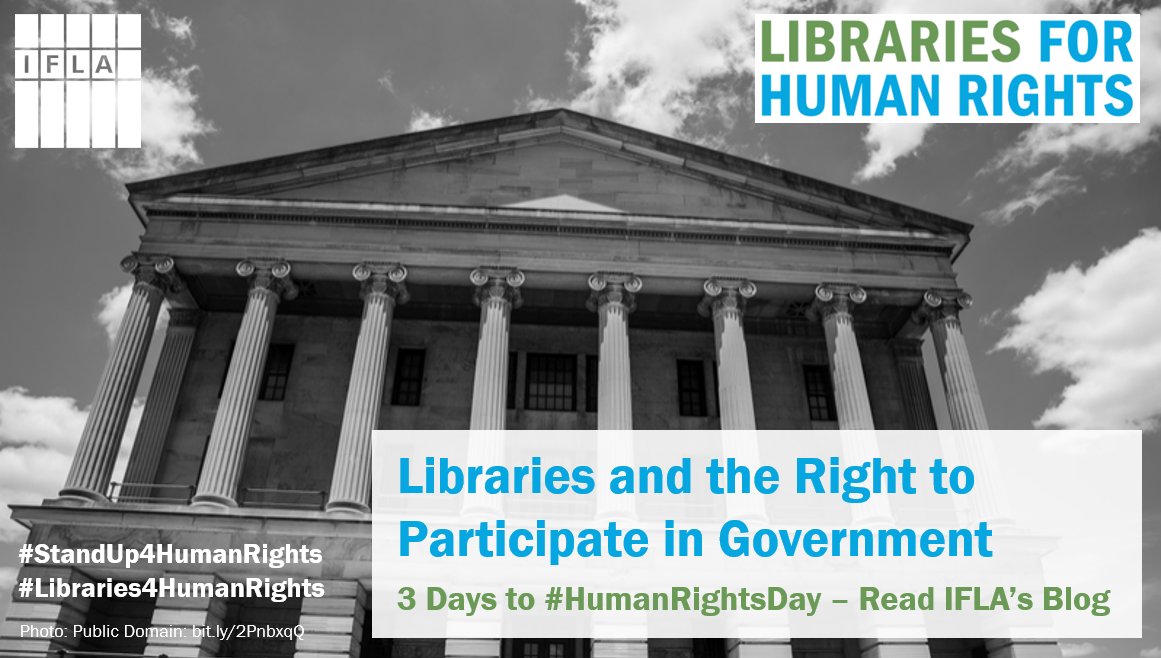A regular refrain in discussions about progress towards the Sustainable Development Goals (SDGs) is that we still face major gaps in the evidence to support decision-making.
Either the data and analysis aren’t there, or they are, but they’re not getting into the right hands.
A first result is that many of the indicators of progress towards the SDGs are effectively empty, either for all or for many countries – i.e. we don’t know where we stand now..
A second is that when leaders are making choices about how to invest resources, and how to intervene in economies and societies, they are not doing it on a sound basis – i.e. we don’t know how to move forwards successfully.
The 2030 Agenda is of course not the first time that this has come up as an issue. In past discussions, one approach has been to develop a ‘science-policy interface’ or SPI.
Given that libraries too – especially government and parliamentary libraries – themselves are closely involved in the work of supporting evidence-based policy-making, this blog explores existing SPIs, and sets out why libraries themselves should work with this term in their own advocacy.
Why SPIs?
At a conceptual level, the Science-Policy Interface refers to engagement between the research and policy communities. Through a stronger interface, it is argued, science should become more of an enabler in policy design, implementation, monitoring, follow-up and review, and give the opportunity to take a more strategic overview of linkages, barriers and opportunities to progress.
Building such an interface requires an effort from both communities. Researchers themselves need to take a stronger cue from the wider world in determining the questions they should look to answer, be they around climate change, equality or any other issues. Politicians should be readier to draw on expertise rather than to pursue popularism or ideology.
With these changes, we can hope both to accelerate the generation of new insights into our climate and society, and to overcome hesitations to take necessary actions.
Existing models have looked to do just this, primarily in the environmental field when it comes to the United Nations – see this great overview from IISD. The Intergovernmental Panel on Climate Change is perhaps the best-known example, but similar efforts played a role in the banning of CFCs, and also now in work around desertification.
In these practical cases, the ‘interface’ has been in the form of a committee of experts who meet and work together in order to identify challenges and work towards consensus on solutions. These groups can be relatively open, although then do need to address key questions around how they define roles and processes, and maintain credibility and sufficient coherence. Given that they are often dealing with evolving research, there is also plenty of room for disagreement.
Recent guidance from the United Nations Environment Programme has therefore, for example, stressed the need to ensure representativeness (including through forming links with partners globally), clear rules around mandates, and good governance.
Another example is the Global Sustainable Development Report (GDSR), which comes out every four years, and looks to provide a cross-disciplinary overview of progress towards the Sustainable Development Goals (SDGs). This is perhaps less of a process than the SPIs mentioned above, but fulfils the same function of bringing insights from research to the heart of policy-making.
Libraries supporting SPIs
There are three potential ways in which libraries contribute to the goals of Science-Policy Interfaces.
The first is simply by ensuring that SPIs are able to benefit from access to the fullest possible evidence base. While the role of libraries is all too often overlooked, both the individual scientists involved in SPIs, and processes as a whole, can benefit from support in getting hold of research, organising information, and sharing it.
This is particularly relevant when it comes to the sort of inter-disciplinary work that SPIs – and the GDSR in particular – promote. Libraries are a key part of the infrastructure for gathering and making such evidence available, as for example highlighted in the Cochrane Call which IFLA signed last year.
While they may not always have the name ‘library’, knowledge hubs, data repositories and other initiatives can ensure that SPIs can focus on the discussions that need to take place. Such tools are indeed a key goal as set out in a 2019 UN Environment Assembly resolution.
Meanwhile, through their understanding of the research space, libraries can also help identify where there are potential gaps or weaknesses.
The second way is through wider advocacy for open access and open science. This can support both interdisciplinarity, and use of scientific outputs in government.
This is because when research outputs are hidden behind paywalls, there is a greater risk that faculties and the libraries that serve them will only focus on resources within the disciplines on which they focus, rather than materials form elsewhere. Paywalls can also mean that government departments with few resources prefer to rely on grey literature, unready to pay publishers for access to their databases.
As a result, by promoting open access and science – both through advocating and by providing key infrastructures such as repositories, libraries can help deliver on a key enabler of SPIs.
The third way is by themselves being a permanent Science-Policy Interface within government and wider law-making. Many government and parliamentary libraries have a role as a gateway, helping to ensure that key emerging insights and information are presented to policymakers in a way that works for them.
In this, the skills and values of libraries can play an important role, helping to assess the quality of different sources, but also then to present information in as neutral a way as possible, in order to enable the best possible decision-making.
The need to base decisions on evidence is increasingly pressing as the time left to achieve the goals of the 2030 Agenda becomes less and less. The emphasis on Science-Policy Interfaces is therefore likely to grow in importance at the UN level.
This should be an opportunity for libraries to demonstrate just one further way in which we can support the delivery of the 2030 Agenda, and to secure the role and resources we need to fulfil our potential.

